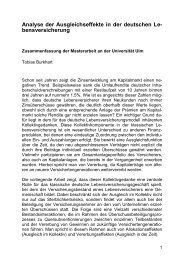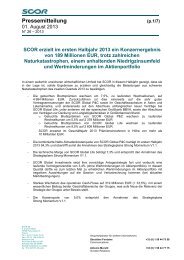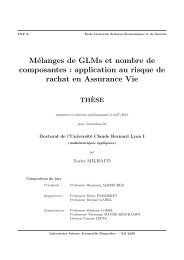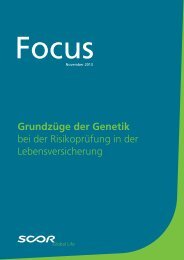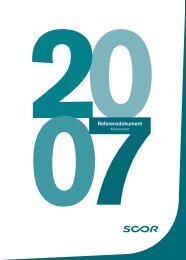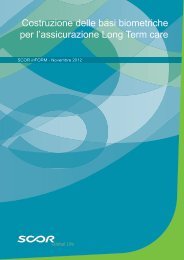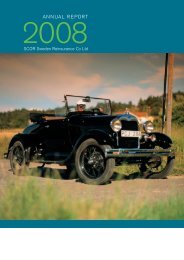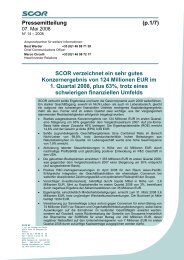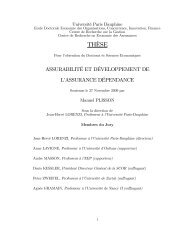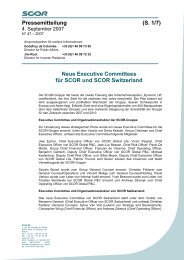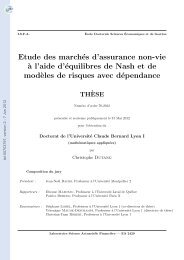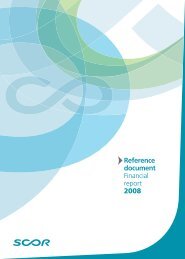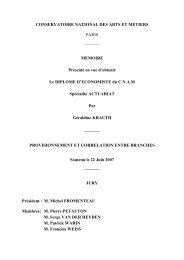4.4 Legal risk - Scor
4.4 Legal risk - Scor
4.4 Legal risk - Scor
You also want an ePaper? Increase the reach of your titles
YUMPU automatically turns print PDFs into web optimized ePapers that Google loves.
• Amendments to IAS 19 – Employee Benefits were issued in June 2011, which make significant changes to the<br />
recognition and measurement of defined benefit pension expense and termination benefits, and to disclosures for<br />
all employee benefit plans. The European Union endorsed the amendments to IAS 19 on 5 June 2012. These<br />
amendments are applicable for annual periods beginning on or after 1 January 2013, with earlier adoption<br />
permitted. For SCOR, the main change of the amendments to IAS 19 compared to the present standard is the<br />
removal of the concept of expected return on plan assets that were previously recognised in profit and loss.<br />
Instead, net interest expense will be calculated on a net funding basis. This will result in an overall increase of the<br />
net periodic pension cost in future periods. However, the profit and loss impact to SCOR is not expected to be<br />
material. In addition, actuarial gains and losses must be recorded directly under other comprehensive income. This<br />
method is already applied by SCOR and therefore this amendment to IAS 19 does not impact the Group’s<br />
consolidated financial statements.<br />
• Amendments to IFRS 7 – Offsetting financial assets and financial liabilities require an entity to disclose information<br />
about rights to set-off related arrangements (e.g., collateral agreements). The disclosures would provide users with<br />
information that is useful in evaluating the effect of netting arrangements on an entity’s financial position. The new<br />
disclosures are required for all recognized financial instruments that are set off in accordance with IAS 32 Financial<br />
Instruments: Presentation. The disclosures also apply to recognized financial instruments that are subject to an<br />
enforceable master netting arrangement or similar agreement, irrespective of whether they are set off in<br />
accordance with IAS 32. The European Union endorsed the amendments on 13 December 2012. These<br />
amendments will not impact the Group’s financial position or performance and become effective for annual periods<br />
beginning on or after 1 January 2013.<br />
• IFRS 13 – Fair Value Measurement provides guidance on how to measure the fair value of financial and nonfinancial<br />
assets and liabilities when required or permitted by IFRS. The European Union has endorsed IFRS 13 on<br />
11 December 2012. The standard is effective for annual periods on or after 1 January 2013. The adoption of<br />
IFRS 13 could affect some of the fair value of certain assets and liabilities. The Group is currently assessing the<br />
impact that this standard will have on its financial position and performance.<br />
• IFRS 10 – Consolidated Financial Statements replaces the portion of IAS 27 Consolidated and Separate Financial<br />
Statements that addresses the accounting for consolidated financial statements. It also includes the issues raised<br />
in SIC-12 Consolidation – Special Purpose Entities. The standard establishes a single control model that applies to<br />
all entities. It will require management to exercise judgment to determine which entities are controlled, and<br />
therefore are required to be consolidated by a parent. The European Union endorsed IFRS 10 on<br />
11 December 2012. This standard is effective for annual periods beginning on or after 1 January 2013 for<br />
companies preparing financial statements in compliance with IFRS issued by the IASB and on or after<br />
1 January 2014 for European listed Companies. The adoption of IFRS 10 is not expected to have a material<br />
impact on the Group’s consolidated financial statements.<br />
• IFRS 11 – Joint Arrangements replaces IAS 31 Interests in Joint Ventures and SIC-13 Jointly-controlled Entities –<br />
Non-monetary Contributions by Venturers. The standard addresses two forms of joint arrangements, i.e. joint<br />
operations and joint ventures. To assess whether there is joint control IFRS 11 uses the principle of control in<br />
IFRS 10. The existing option to account for jointly controlled entities under IAS 31 using proportionate<br />
consolidation is removed in this standard. The European Union endorsed IFRS 11 on 11 December 2012. This<br />
standard is effective for annual periods beginning on or after 1 January 2013 for companies preparing financial<br />
statements in compliance with IFRS issued by the IASB and on or after 1 January 2014 for European listed<br />
Companies. SCOR has no material joint arrangements. As such the adoption of this standard is expected to have<br />
no impact on the financial statement of the Group.<br />
• IFRS 12 – Disclosure of Interests in Other Entities includes all the disclosures that were previously in IAS 27,<br />
IAS 31 and IAS 28 Investment in Associates. A number of new disclosures are added to the existing requirements<br />
such as the judgments made to determine whether control of another entity exists. The European Union endorsed<br />
IFRS 12 on 11 December 2012. This standard is effective for annual periods beginning on or after 1 January 2013<br />
for companies preparing financial statements in compliance with IFRS issued by the IASB and on or after<br />
1 January 2014 for European listed Companies. IFRS 12 is a disclosure only standard and therefore will have no<br />
effect on profit or loss or the equity of the Group.<br />
• As a consequence of the new IFRS 10 and IFRS 12, what remains of IAS 27 is limited to accounting for<br />
subsidiaries, jointly controlled entities, and associates in separate financial statements. The European Union<br />
endorsed the amendments to IAS 27 on 11 December 2012. The amendments are effective for annual periods<br />
beginning on or after 1 January 2013 for companies preparing financial statements in compliance with IFRS issued<br />
by the IASB and on or after 1 January 2014 for European listed Companies. The Group does not present<br />
standalone IFRS financial statements.<br />
• As a consequence of the new IFRS 11 and IFRS 12, IAS 28 has been renamed IAS 28 Investments in Associates<br />
and Joint Ventures, and describes the application of the equity method to investments in joint ventures in addition<br />
to associates. The European Union endorsed the amendments to IAS 28 on 11 December 2012. The amendments<br />
200



